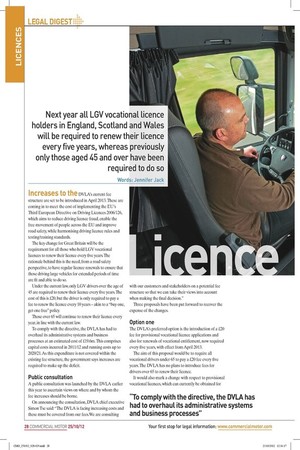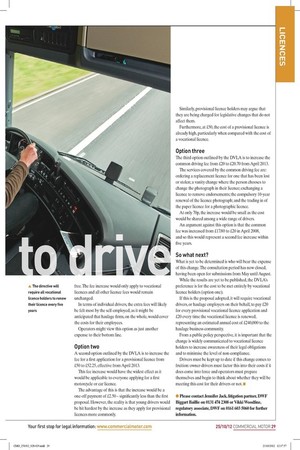cence o drive
Page 22

Page 23

If you've noticed an error in this article please click here to report it so we can fix it.
Next year all LGV vocational licence holders in England, Scotland and Wales will be required to renew their licence every five years, whereas previously only those aged 45 and over have been required to do so
Words: Jennifer Jack Increases to the DVLA’s current fee structure are set to be introduced in April 2013. These are coming in to meet the cost of implementing the EU’s Third European Directive on Driving Licences 2006/126, which aims to reduce driving licence fraud, enable the free movement of people across the EU and improve road safety, while harmonising driving licence rules and testing/training standards.
The key change for Great Britain will be the requirement for all those who hold LGV vocational licences to renew their licence every five years. The rationale behind this is the need, from a road safety perspective, to have regular licence renewals to ensure that those driving large vehicles for extended periods of time are fit and able to do so.
Under the current law, only LGV drivers over the age of 45 are required to renew their licence every five years. The cost of this is £20, but the driver is only required to pay a fee to renew the licence every 10 years – akin to a “buy one, get one free” policy.
Those over 65 will continue to renew their licence every year, in line with the current law.
To comply with the directive, the DVLA has had to overhaul its administrative systems and business processes at an estimated cost of £19.6m. This comprises capital costs incurred in 2011/12 and running costs up to 2020/21. As this expenditure is not covered within the existing fee structure, the government says increases are required to make up the deficit.
Public consultation
A public consultation was launched by the DVLA earlier this year to ascertain views on where and by whom the fee increases should be borne.
On announcing the consultation, DVLA chief executive Simon Tse said: “The DVLA is facing increasing costs and these must be covered from our fees.We are consulting with our customers and stakeholders on a potential fee structure so that we can take their views into account when making the final decision.” Three proposals have been put forward to recover the expense of the changes.
Option one
The DVLA’s preferred option is the introduction of a £20 fee for provisional vocational licence applications and also for renewals of vocational entitlement, now required every five years, with effect from April 2013.
The aim of this proposal would be to require all vocational drivers under 65 to pay a £20 fee every five years. The DVLA has no plans to introduce fees for drivers over 65 to renew their licence.
It would also mark a change with respect to provisional vocational licences, which can currently be obtained for free. The fee increase would only apply to vocational licences and all other licence fees would remain unchanged.
In terms of individual drivers, the extra fees will likely be felt most by the self-employed, as it might be anticipated that haulage firms, on the whole, would cover the costs for their employees.
Operators might view this option as just another expense to their bottom line.
Option two
A second option outlined by the DVLA is to increase the fee for a first application for a provisional licence from £50 to £52.25, effective from April 2013.
This fee increase would have the widest effect as it would be applicable to everyone applying for a first motorcycle or car licence.
The advantage of this is that the increase would be a one-off payment of £2.50 – significantly less than the first proposal. However, the reality is that young drivers would be hit hardest by the increase as they apply for provisional licences more commonly. Similarly, provisional licence holders may argue that they are being charged for legislative changes that do not affect them.
Furthermore, at £50, the cost of a provisional licence is already high, particularly when compared with the cost of a vocational licence.
Option three
The third option outlined by the DVLA is to increase the common driving fee from £20 to £20.70 from April 2013.
The services covered by the common driving fee are: ordering a replacement licence for one that has been lost or stolen; a vanity change where the person chooses to change the photograph in their licence; exchanging a licence to remove endorsements; the compulsory 10-year renewal of the licence photograph; and the trading in of the paper licence for a photographic licence.
At only 70p, the increase would be small as the cost would be shared among a wide range of drivers.
An argument against this option is that the common fee was increased from £17.80 to £20 in April 2008, and so this would represent a second fee increase within five years.
So what next?
What is yet to be determined is who will bear the expense of this change. The consultation period has now closed, having been open for submissions from May until August.
While the results are yet to be published, the DVLA’s preference is for the cost to be met entirely by vocational licence holders (option one).
If this is the proposal adopted, it will require vocational drivers, or haulage employers on their behalf, to pay £20 for every provisional vocational licence application and £20 every time the vocational licence is renewed, representing an estimated annual cost of £240,000 to the haulage business community.
From a public policy perspective, it is important that the change is widely communicated to vocational licence holders to increase awareness of their legal obligations and to minimise the level of non-compliance.
Drivers must be kept up to date if this change comes to fruition: owner-drivers must factor this into their costs if it does come into force and operators must prepare themselves and begin to think about whether they will be meeting this cost for their drivers or not. n l Please contact Jennifer Jack, litigation partner, DWF Biggart Baillie on 0131 474 2308 or Vikki Woodfine, regulatory associate, DWF on 0161 603 5060 for further information.












































